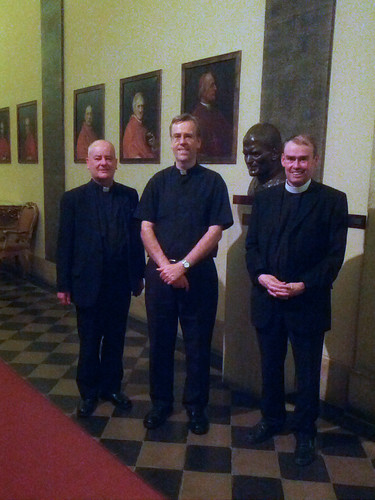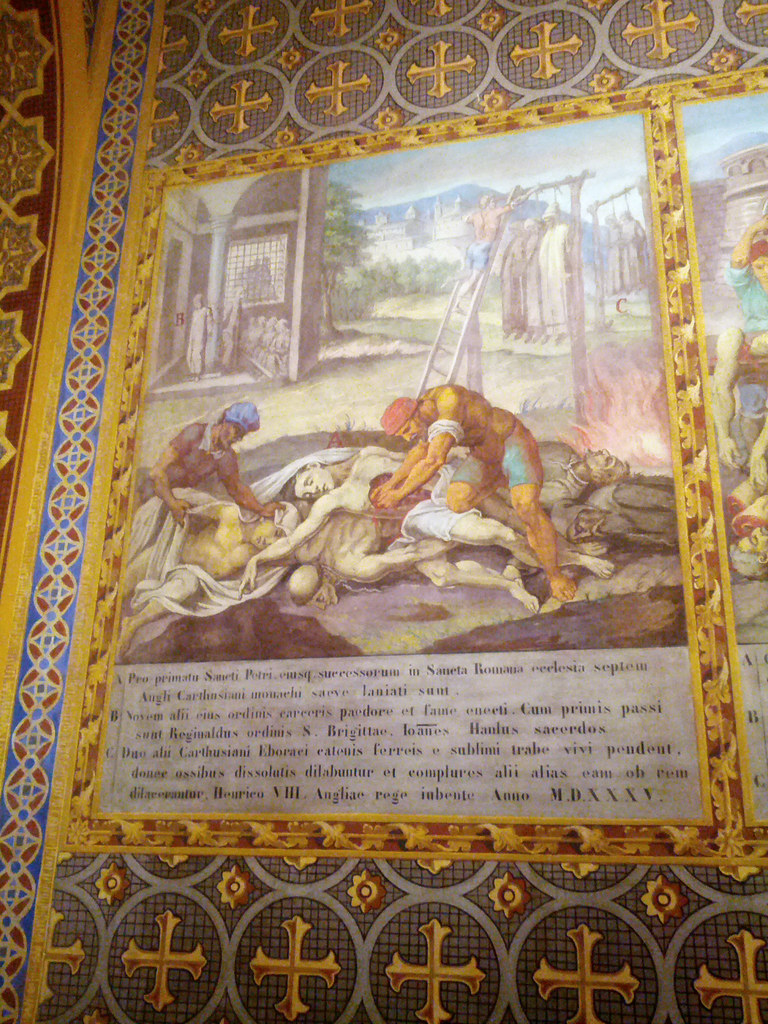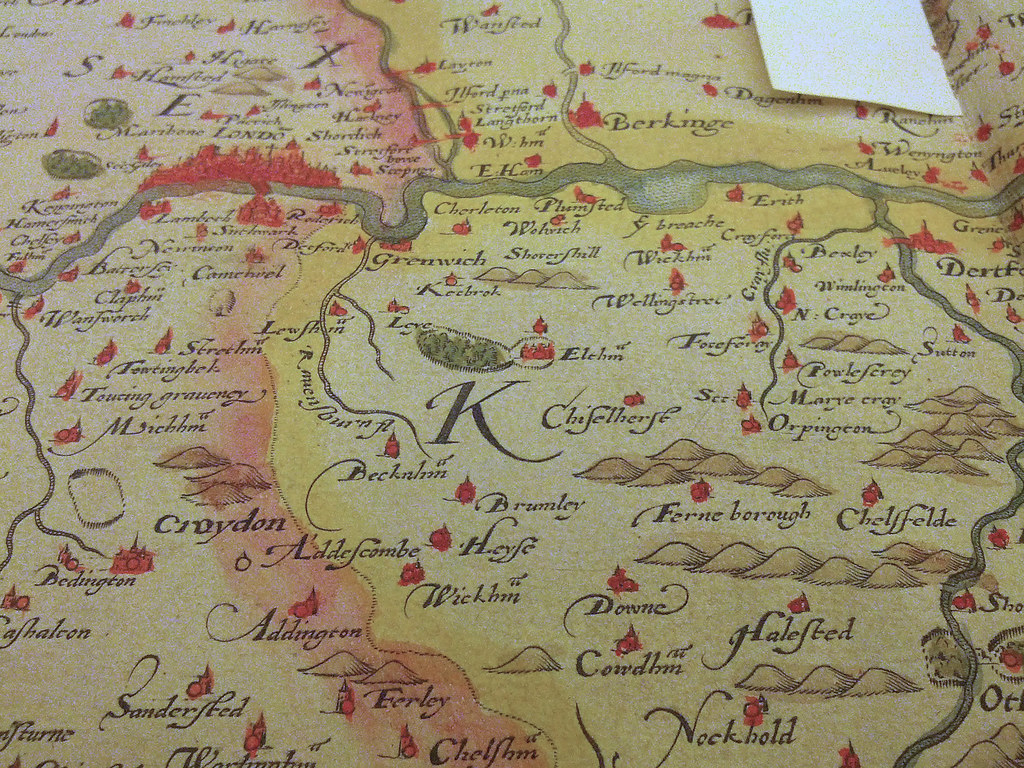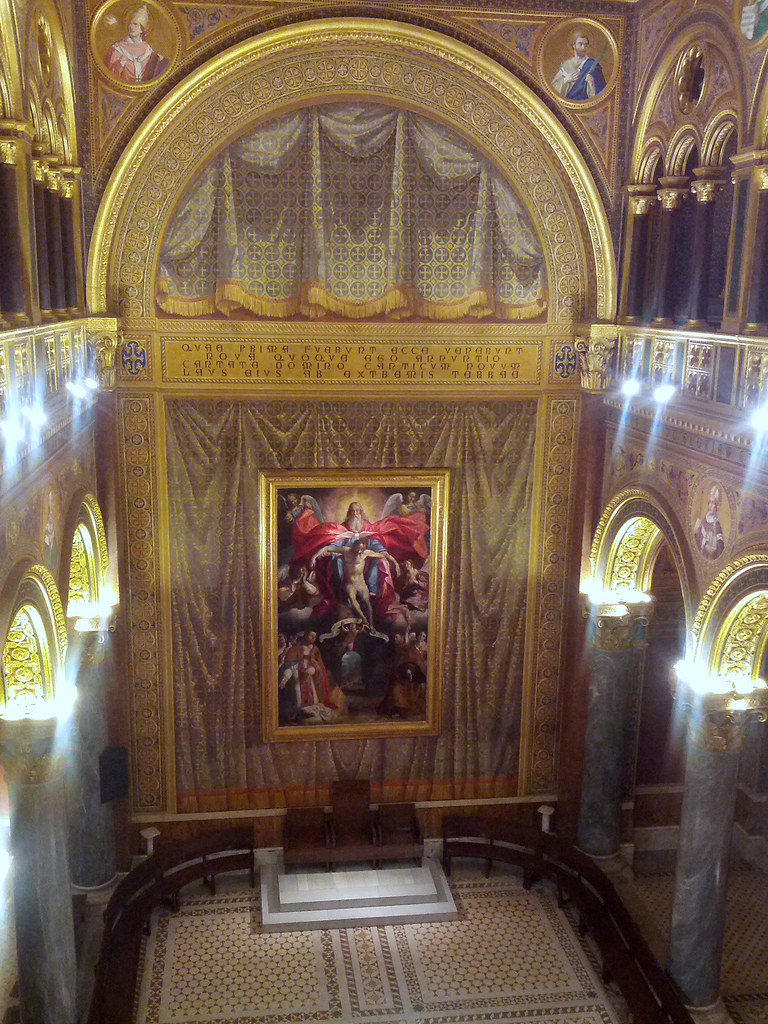 I was fortunate enough to be invited to dinner at the Venerable English College during my holiday in Rome. I say that "I" was invited... actually Fr. Charles Briggs and Fr. Tim Finigan, (former students, and friends with the Rector) were invited for dinner, and I got to tag along...
I was fortunate enough to be invited to dinner at the Venerable English College during my holiday in Rome. I say that "I" was invited... actually Fr. Charles Briggs and Fr. Tim Finigan, (former students, and friends with the Rector) were invited for dinner, and I got to tag along...Wednesday evening is "Guest Night." We arrived just before the pre-dinner drinks and Fr. Tim and Fr. Charles showed me the Martyrs' Chapel and the garden, and they promised to try and show me a little more of the College after dinner, particularly the Church.
The thing about places in Rome, I have decided, is that one has to remember to look up. The ceilings are usually just as beautiful as the rooms, and sometimes even more so! The Refectory was dominated by a huge painting of Christ visiting the Pharisee (with the woman who poured ointment over Christ's feet) and I completely forgot to look up, so missed the ceiling painting of St. George by Pozzo. It seems that there are one or two readers of my blog over at the English College - several people were keen to point out the presence of the cat sitting by Christ's chair. The cat was the spitting image of Monsignor Miaowrini! It seems that the cat has only recently been revealed, when the painting was cleaned up.
Dinner was delicious, and for once I did more listening than talking, as I listened avidly to the reminiscences of Fr. Tim and Fr. Charles as they chatted to Monsignor Nicholas Hudson (the Rector), Monsignor Mark Langham (who was visiting) and a few other people who drifted over to say hallo.
After dinner, Monsignor Hudson asked if I would like to see the College Church. I was very keen to do so, but I have to say that I was absolutely amazed when he sat me down on a pew and personally proceeded to tell me the full history of the College, right from its foundation as a pilgrim hospice in the 14th Century. It was fascinating stuff, and I was pretty overwhelmed, first by his generosity in taking the time to recount the history, and secondly by the sheer volume of information. We then went upstairs to the Tribune of the church - the walkway goes around three sides of the church, allowing an amazing view of the nave and the Martyrs' Picture...
The Martyrs' Picture, showing the Blessed Trinity with St. Thomas of Canterbury and St. Edmund (the patrons of the two medieval English hospices) became an icon of the College Martyrs: whenever news of a martyrdom of former students reached Rome, the College students would gather together by the picture to sing a Te Deum in thanksgiving.
 On the walls of the Tribune are copies of paintings showing the sufferings of the students of the English College who were martyred during the Reformation when they returned to England. The paintings, by Pomerancio, were of considerable importance when the cause for the beatification and canonisation of the English and Welsh martyrs was being examined. The pictures quite take your breath away, as they're rather graphic in detail! There are also many pictures of saints associated with bringing the Catholic faith to England, whether in legend (such as St. Joseph of Arimathea's visit to Glastonbury) or in fact (St. Alban's martyrdom.)
On the walls of the Tribune are copies of paintings showing the sufferings of the students of the English College who were martyred during the Reformation when they returned to England. The paintings, by Pomerancio, were of considerable importance when the cause for the beatification and canonisation of the English and Welsh martyrs was being examined. The pictures quite take your breath away, as they're rather graphic in detail! There are also many pictures of saints associated with bringing the Catholic faith to England, whether in legend (such as St. Joseph of Arimathea's visit to Glastonbury) or in fact (St. Alban's martyrdom.) Monsignor Hudson then asked if I'd like to see the libraries.There were some scrapbooks out in the Third Library, and we were encouraged to look through these while Monsignor Hudson went to fetch some "treasures" from the Archives. And what treasures they proved to be! I actually got to see (and touch) the Liber Ruber - the book which recorded the Missionary Oath taken by the students in which they promised to return to England on completion of their studies for the priesthood. The names (and in some cases, signatures) of the students, and what they said and did are all recorded. The first martyr of the College, St. Ralph Sherwin is recorded as having said that he was ready to return to England "rather today than tomorrow" in order to restore the Catholic faith to England.
Monsignor Hudson then asked if I'd like to see the libraries.There were some scrapbooks out in the Third Library, and we were encouraged to look through these while Monsignor Hudson went to fetch some "treasures" from the Archives. And what treasures they proved to be! I actually got to see (and touch) the Liber Ruber - the book which recorded the Missionary Oath taken by the students in which they promised to return to England on completion of their studies for the priesthood. The names (and in some cases, signatures) of the students, and what they said and did are all recorded. The first martyr of the College, St. Ralph Sherwin is recorded as having said that he was ready to return to England "rather today than tomorrow" in order to restore the Catholic faith to England. I also got to see the letter from St. Charles Borromeo in which he records the visit of St. Ralph Sherwinand his companions to Milan en route to England, in which the Bishop of Milan offered hospitality to any other students on their way back to England and probable martyrdom, and a book of maps from the 16th century which were probably used by the students of the College when trying to work out where they would go in England once they arrived. We were very edified to see that Chislehurst (Fr. Charles' parish), Eltham Palace, Bexley and Welling all featured (Blackfen parish was formed out of a part of Welling.)
I also got to see the letter from St. Charles Borromeo in which he records the visit of St. Ralph Sherwinand his companions to Milan en route to England, in which the Bishop of Milan offered hospitality to any other students on their way back to England and probable martyrdom, and a book of maps from the 16th century which were probably used by the students of the College when trying to work out where they would go in England once they arrived. We were very edified to see that Chislehurst (Fr. Charles' parish), Eltham Palace, Bexley and Welling all featured (Blackfen parish was formed out of a part of Welling.) We finished up in the Salon for coffee - this was part of the palazzo which had been built in 1654 to replace the prison next door to the College, and the only part of the buildings not completely trashed by Napoleon's troops - apparently they liked living in style! As a parting gift, Monsignor Hudson gave me a copy of Monsignor Mark Langham's book on the history of the English College. The Venerable English College, Rome: a short history and guide is an excellent book, and has lots of pictures (though I'm delighted to see that I have all the important ones myself, and some of mine are, IMHO, better...) I note that one second-hand copy of the book is available from Amazon (not mine, I hasten to add!!), but I suspect that it would be cheaper to buy it directly from the College itself.
We finished up in the Salon for coffee - this was part of the palazzo which had been built in 1654 to replace the prison next door to the College, and the only part of the buildings not completely trashed by Napoleon's troops - apparently they liked living in style! As a parting gift, Monsignor Hudson gave me a copy of Monsignor Mark Langham's book on the history of the English College. The Venerable English College, Rome: a short history and guide is an excellent book, and has lots of pictures (though I'm delighted to see that I have all the important ones myself, and some of mine are, IMHO, better...) I note that one second-hand copy of the book is available from Amazon (not mine, I hasten to add!!), but I suspect that it would be cheaper to buy it directly from the College itself.I would just like to thank Monsignor Nicholas Hudson once again for the very great kindness and hospitality he showed me.
This post is getting to be almost as long as the book, so I shall end here, but I took quite a few photos, and you can see them in the Flickr set for the VEC.


Excellent Post on your Vatican holiday, Mac.
ReplyDeleteOne could almost have been there oneself,
so good was your description.
Flattery, Zephy darling, will get you almost everywhere...
ReplyDelete...though I must point out that the Venerable English College is in Rome, not the Vatican...
:-P
That Miaowrini gets everywhere. But she has a good example to follow. What an excellent descripton of your visit, full of colour and atmosphere.
ReplyDeleteI suppose it would be too disruptive to admit tours. I think that seeing the evidence of the martyrs' foreknowledge of their fate would have a profound effect on all of us. Somehow, we do seem to have lost that connection.
PS Would love to know what you had for dinner.
There is no doubt that the students knew exactly what lay in store for them, and they still returned to England to bring the Mass and the sacraments to the faithful. You're absolutely right, Genty, reflecting on this really does bring home what the Mass is worth.
ReplyDeleteDinner was delicious. Pasta in a tomato sauce to start. Roast chicken and boiled potatoes - and there were vegetables of some description, but I don't eat veg. Yoghurt for dessert (actually mine wasn't yoghurt, I chose chocolate, but I can't remember what it's called... it was yoghurt-like!!)
Mac, I'm so jealous! I'd love to visit the Venerabile (I know Palazzola, but it's not the same) and see the libraries ahhhhhhh!
ReplyDeleteTee hee :)
Oh and why don't you eat vegetables?
I love the Venerabile and stayed there a long time ago for two weeks. The place is wonderful. I also went to Palazzola. Happy days.
ReplyDeleteI hope they told you about the ghost at the Venerabile. It was a hot story years ago and I hope not lost...Also, of course, you know about St. Philip Neri standing outside saying goodbye to the likes of St. Edmund Campion, saying, "There go the flower of the martyrs." Would love to visit again and am glad you got to go there...
Clare Asquith has a book "Shadow Play" in which she comprehensively shows how Shakespeare was a Catholic and that his plays were coded to support the desperate faithful trying to remain true to the old faith. It cannot be a stretch of the imagination that he would have met and received the sacraments from those martyrs like Campion, Garnet and Southwell. It makes my heart jump for joy to think of those liberals and republicans who claim him as their own!
ReplyDeleteThe Catholic bard!